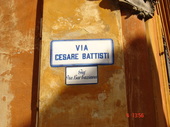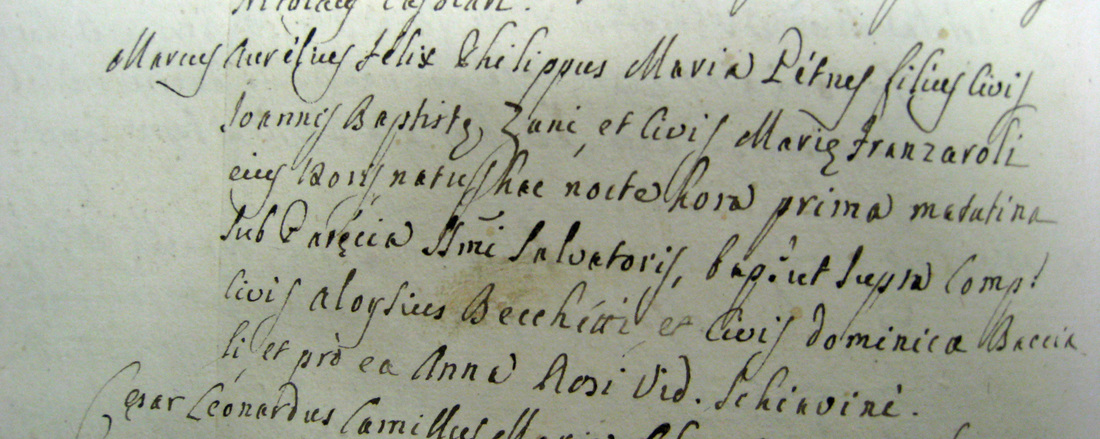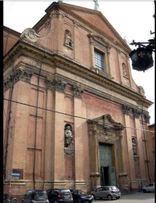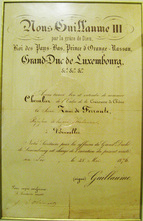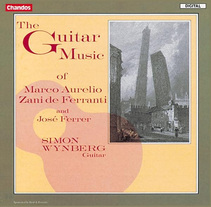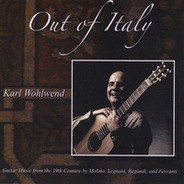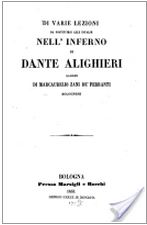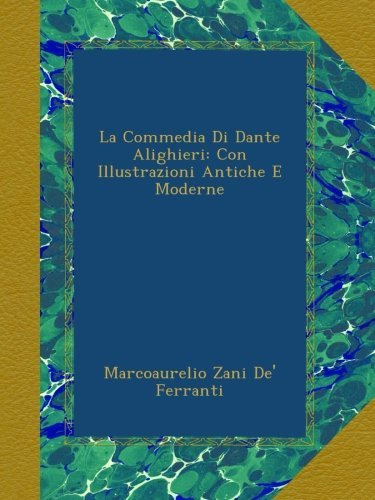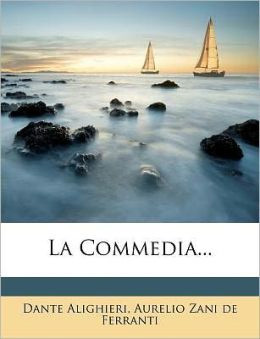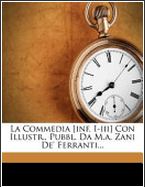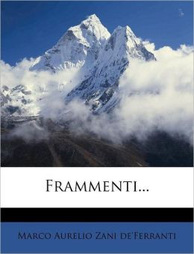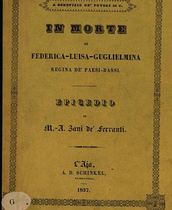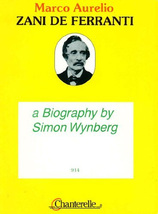Marco Aurelio Felice Filippo Maria Pietro de Ferranti Zani 1801-1878
Marco Aurelio
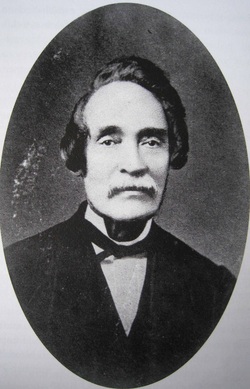
Marco Aurelio Zani de Ferranti
His parents were Giovanni Battista Zani and Maria Franzaroli
Born 23 Dec 1801 in Via Barbatiana, (now Via Cesare Battista) Bologna, Italy
Baptised 23 Dec 1801 in the Church of San Salvatore, Bologna
Died 28 Nov 1878 in Pisa, Toscana, Italy
His father Giovanni Battista was the son of Marco Felice.
Marco's mother died in 1803 when Marco was less than 2 years old.
They were turbulent times, Napoleon invaded Bologna in 1796 taking it from its previous ruler - The Vatican.
Born 23 Dec 1801 in Via Barbatiana, (now Via Cesare Battista) Bologna, Italy
Baptised 23 Dec 1801 in the Church of San Salvatore, Bologna
Died 28 Nov 1878 in Pisa, Toscana, Italy
His father Giovanni Battista was the son of Marco Felice.
Marco's mother died in 1803 when Marco was less than 2 years old.
They were turbulent times, Napoleon invaded Bologna in 1796 taking it from its previous ruler - The Vatican.
Rough Transcription
Marcus Aurelius Felix Philippus Maria ?Pietrus filius Civis Joannis Baptistis Zani, et Civis Maria Franzaroli eius uxoris natus hac nocte hora prima ?meridian Sub Paraccia Dmi Salvatori, Baptismus ut Compater civis aloysius Becchitti et Civis dominica Bacciali,
et pro ea Anna Dosi Vid Schinviri
Rough Translation
Marco Aurelio Felice Filippo Maria ?Pietro son of Citizen Giovanni Battista Zani and Citizen Maria
Franzaroli his wife born this night hour pm parish of S Salvatore. Baptised
as godparents Citizen Luigi Bechitti and Citizen Dominica Bacciali,
and as representative Anna Rosi Vid Schinviri
Marcus Aurelius Felix Philippus Maria ?Pietrus filius Civis Joannis Baptistis Zani, et Civis Maria Franzaroli eius uxoris natus hac nocte hora prima ?meridian Sub Paraccia Dmi Salvatori, Baptismus ut Compater civis aloysius Becchitti et Civis dominica Bacciali,
et pro ea Anna Dosi Vid Schinviri
Rough Translation
Marco Aurelio Felice Filippo Maria ?Pietro son of Citizen Giovanni Battista Zani and Citizen Maria
Franzaroli his wife born this night hour pm parish of S Salvatore. Baptised
as godparents Citizen Luigi Bechitti and Citizen Dominica Bacciali,
and as representative Anna Rosi Vid Schinviri
|
This is the church where he was baptised -
The Church of San Salvatore It is also where his grandfather was buried It is still there, with it's entrance in Via Cesare Battista, very near Palazzo Mazzacorati It was closed for several years but is now open again, having been taken over by a French order of monks. They now have a busy and devout congregation, but sadly have no knowledge of the history of the church. |
In 1803 when Marco was not yet 2 year's old, his mother died and his father had to leave Italy.
It is only recently that the real story has been discovered.
His father killed his pregnant mother in a jealous madness by stabbing her 46 times
Marco , in the absence of his father , was presumably brought up by a grandmother
The house in Via Cesare Battista was sold.
When old enough, he was sent away to school in Lucca in Tuscany
He first learnt the violin and was said to show great talent
He then went to hear Paganini play the guitar and determined that he would learn to play like him, starting guitar lessons immediately.
Then, later, in his teens, he went to visit his father in Paris and decided that the guitar would definitely be a better instrument for him. It was perhaps easier to excel at and perhaps had greater 'pulling power'. The same reasons that still resonate with today's young males.
At age 19, Marco decided he was good enough at the guitar - and went to Paris - to begin his career as a concert guitarist and composer.
Marco was involved in underground politics for many years. He supported the formation of a unified free state of Italy - the Risorgimento. This frequently got him into trouble.
At one point he was put on trial in Russia and sentenced to banishment in Siberia. Thanks to last minute intervention, he was saved and smuggled over the border into Scandinavia.
For a while he was persona non-grata in most European countries.
Getting married at that time, was very convenient, in that it gave him the right to live in the Netherlands
He married one of his music students, Trinette Julie van Bever, in 1830 in Brussels City Hall
He called her - Julie. She was the daughter of a merchant of paintings originally from Geel near Antwerp.
They had
1. Cesar - Giulio Cesare Zani de Ferranti 1831
2. Georges - Orazio Giorgio Zani de Ferranti 1834
3. Jules - 1840 (who may have been illegitimate and by another woman. Nothing is known about him except a birth certificate found by Marc van de Cruys)
During the revolt of 1830, in Brussels, in which the Belgians fought for independence from Holland, Marco sided with the Belgians. In 1831 this was granted, shortly followed by similar events in France, when Charles the 10th was overthrown. Marco was then again able to enter most European countries and Cesar was born in Paris.
Marco needed to settle down a bit and provide for this family. In 1834 he was appointed to the Royal Conservatoire of Brussels as Professor - in Italian. Later in that year he was appointed 'Guitarist to the King ' - by King Leopold of Saxe-Coburg. He also continued to compose, tour and perform.
Sadly his wife Trinette Julia became mentally ill and in about 1849 was taken into a home in Geel (her native town) where she died in 1851.
Marco, like many modern day rock stars, was a womaniser and had numerous affairs.
In 1855 aged 54, he married again - another music student, 20 year old Euphemie Whittman
(an accomplished pianist and alto) in Bologna.
They had a child, also called Euphemie, in 1855 (who must have died young)
This second wife died a year later in 1856 and Marco was devastated.
It is only recently that the real story has been discovered.
His father killed his pregnant mother in a jealous madness by stabbing her 46 times
Marco , in the absence of his father , was presumably brought up by a grandmother
The house in Via Cesare Battista was sold.
When old enough, he was sent away to school in Lucca in Tuscany
He first learnt the violin and was said to show great talent
He then went to hear Paganini play the guitar and determined that he would learn to play like him, starting guitar lessons immediately.
Then, later, in his teens, he went to visit his father in Paris and decided that the guitar would definitely be a better instrument for him. It was perhaps easier to excel at and perhaps had greater 'pulling power'. The same reasons that still resonate with today's young males.
At age 19, Marco decided he was good enough at the guitar - and went to Paris - to begin his career as a concert guitarist and composer.
Marco was involved in underground politics for many years. He supported the formation of a unified free state of Italy - the Risorgimento. This frequently got him into trouble.
At one point he was put on trial in Russia and sentenced to banishment in Siberia. Thanks to last minute intervention, he was saved and smuggled over the border into Scandinavia.
For a while he was persona non-grata in most European countries.
Getting married at that time, was very convenient, in that it gave him the right to live in the Netherlands
He married one of his music students, Trinette Julie van Bever, in 1830 in Brussels City Hall
He called her - Julie. She was the daughter of a merchant of paintings originally from Geel near Antwerp.
They had
1. Cesar - Giulio Cesare Zani de Ferranti 1831
2. Georges - Orazio Giorgio Zani de Ferranti 1834
3. Jules - 1840 (who may have been illegitimate and by another woman. Nothing is known about him except a birth certificate found by Marc van de Cruys)
During the revolt of 1830, in Brussels, in which the Belgians fought for independence from Holland, Marco sided with the Belgians. In 1831 this was granted, shortly followed by similar events in France, when Charles the 10th was overthrown. Marco was then again able to enter most European countries and Cesar was born in Paris.
Marco needed to settle down a bit and provide for this family. In 1834 he was appointed to the Royal Conservatoire of Brussels as Professor - in Italian. Later in that year he was appointed 'Guitarist to the King ' - by King Leopold of Saxe-Coburg. He also continued to compose, tour and perform.
Sadly his wife Trinette Julia became mentally ill and in about 1849 was taken into a home in Geel (her native town) where she died in 1851.
Marco, like many modern day rock stars, was a womaniser and had numerous affairs.
In 1855 aged 54, he married again - another music student, 20 year old Euphemie Whittman
(an accomplished pianist and alto) in Bologna.
They had a child, also called Euphemie, in 1855 (who must have died young)
This second wife died a year later in 1856 and Marco was devastated.
Marco did have a sort of rock star existence for many years. Going from place to place, giving concerts all over Europe. He even went to America, successfully introducing classical guitar to the Americans. He liked to live the high life and seemed to be always penniless and begging money from rich people he purported to know. His son Cesar received many letters from him, very often asking for money.
In his later years, he wrote in his letters of the pleasure he got from his grandchildren and a regret that he had not had more time with his own children when they were young.
He died alone in Pisa where he went to escape the colder northern climate.
Marco Aurelio called himself - Zani de Ferranti
Sometimes he just called himself - Ferranti
He died alone in Pisa where he went to escape the colder northern climate.
Marco Aurelio called himself - Zani de Ferranti
Sometimes he just called himself - Ferranti
|
His music has been compiled in manuscript in several volumes of " The Ferranti Chanterelle Series"
and on CD, both by Simon Wynberg. The CD is called - The Guitar Music of Marco Aurelio Zani de Ferranti and Jose Ferrer and is available on the internet at www.discogs.com |
|
His music is also on a CD by Carl Wohlwend called - Out of Italy
http://www.cdbaby.com/cd/karlwohlwend2 |
Terz Guitar
Dr James Buckland has recorded a CD (10$ plus shipping)
"Sonatas and Fantasies for Guitar"
He starts with the Fantasy Op. 7 By Zani de Ferranti - performed as written for terz guitar.
Click here to see more
The terz guitar was a bit smaller than normal and tuned to a higher pitch (a minor 3rd higher, i.e.: "Third" = "Terz"). Mostly, it was used for ensemble works, but Zani de Ferranti wrote that one solo specifically indicating terz guitar.
Dr Buckland has performed a lot of Feranti's music, including his music for guitar tuned to E major. These works are extraordinarily difficult as they are not only technically challenging, but require the performer to relearn much of the fingerboard and adapt to an entirely different set of instincts. He was the only composer to do this, at least to that level of sophistication.
it is Dr Buckland's plan to record an all Zani de Ferranti CD sometime in the future
Dr. James Buckland - Professor of Guitar Studies
Department of Music
Presbyterian College
Clinton, SC
jpbucklan@presby.edu
Dr James Buckland has recorded a CD (10$ plus shipping)
"Sonatas and Fantasies for Guitar"
He starts with the Fantasy Op. 7 By Zani de Ferranti - performed as written for terz guitar.
Click here to see more
The terz guitar was a bit smaller than normal and tuned to a higher pitch (a minor 3rd higher, i.e.: "Third" = "Terz"). Mostly, it was used for ensemble works, but Zani de Ferranti wrote that one solo specifically indicating terz guitar.
Dr Buckland has performed a lot of Feranti's music, including his music for guitar tuned to E major. These works are extraordinarily difficult as they are not only technically challenging, but require the performer to relearn much of the fingerboard and adapt to an entirely different set of instincts. He was the only composer to do this, at least to that level of sophistication.
it is Dr Buckland's plan to record an all Zani de Ferranti CD sometime in the future
Dr. James Buckland - Professor of Guitar Studies
Department of Music
Presbyterian College
Clinton, SC
jpbucklan@presby.edu
|
Literature
As well as music and the guitar he was passionate about literature and poetry. As he got older, he lost interest in the guitar and his burning purpose in life became - to write and get published his treatise on Dante's Inferno. This he finally did in 1855. One can download it free here from Google books or else buy a new reproduction from the links below Amazon Amazon.co.uk Barnes & Noble .com As far as I am aware they are all the same book inside a different cover - All in Italian |
|
Marco also wrote poetry
His book Frammenti is still available on the internet - Free here at Google books or to buy here at Amazon Frammenti is his poetry anthology. Brussels 1838 A number of short poems in this collection have short preambles which give some insight into the context of their composition and the emotional impetus which led Marco to write them. Many are dated and specify the city in which they were written |
|
This is something else by Marco available free here Google books It is called - In morte di Federica-Luisa-Guglielmina Regina de' Paesi-Bassi: epicedio By Marco Aurelio Zani de' Ferranti |
His life - in much more detail - can be read in 2 excellent books
The Kings Guitarist by Marc Van de Cruys
http://users.telenet.be/homunculus/Marco%20Aurelio%20Zani%20de%20Ferranti.html
To buy a copy contact Marc at the link below
homunculus@yucom.be
The Kings Guitarist by Marc Van de Cruys
http://users.telenet.be/homunculus/Marco%20Aurelio%20Zani%20de%20Ferranti.html
To buy a copy contact Marc at the link below
homunculus@yucom.be
